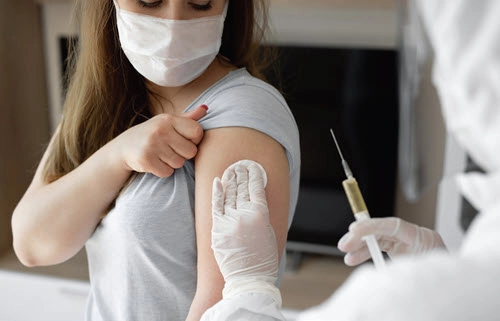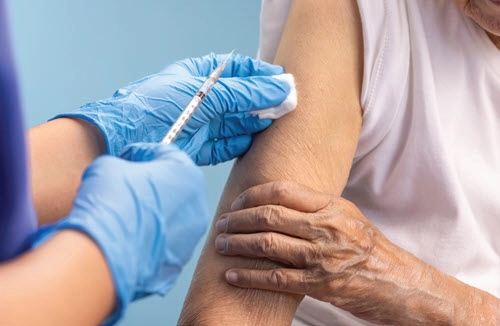MDS Alert
Make These Adjustments for COVID-19 Vaccinations Now
The first reporting period is just around the corner in mid-June.
On May 11, 2021, the Centers for Medicare & Medicaid Services (CMS) released an interim final rule that includes a new provision: Long-Term Care (LTC) Facility Vaccine Immunization Requirements for Residents and Staff. This establishes new requirements for educating residents or their representatives, as well as staff, on the specifics surrounding the COVID-19 vaccine, as well as offering it to them. Additionally, facilities have new reporting responsibilities surrounding the vaccine.
This new requirement also entails a new F-tag, F887 (COVID-19 Immunization Review). “The crux of this regulation is the requirement that nursing homes develop and implement policies and procedures that ensure that staff, residents and representatives receive education about the COVID-19 vaccine and that vaccines are offered to all who choose to be immunized,” says Linda Elizaitis, RN, RAC-CT, BS, president and founder of CMS Compliance Group in Melville, New York.
Understand Extent of New Responsibilities
Basically, CMS is calling on long-term care facilities, both skilled nursing homes and nursing homes, to get their residents and staff vaccinated, and to be able to account for the corresponding numbers.
This includes policies and procedures involving educating residents or their representatives, as well as staff, about the benefits and side effects of COVID-19; offering the vaccine; and reporting the numbers, says David R. Wright, director of quality, safety, & oversight group at CMS in Baltimore.
Although facilities are allowed and encouraged to provide the vaccine directly (or through an arrangement with a local health department, pharmacy, etc.), a lot of the work specified in this interim final rule must happen before the individual has the opportunity for a jab.

“Screening individuals prior to offering the vaccination for prior immunization, medical precautions and contraindications is necessary for determining whether they are appropriate candidates for vaccination at any given time,” Wright says.
Know Who’s Affected
The new rules apply to staff, which CMS defines as folks who work in a facility at least once a week, including those who are not currently working due to illness, disability, or scheduled time off, as well as people who work under contract, like hospice and dialysis staff; physical, occupation, and speech therapists; and mental health professionals. Other people, like volunteers, aren’t included in the mandate but facilities are instructed to provide education as well as the vaccine if vaccine is available.
Additionally, people who are performing work at a facility only briefly and infrequently, like those providing deliveries or repairs, aren’t included in the mandate either, but facilities may provide education and vaccine if they have the availability.
If staff members had an earlier opportunity to get a vaccine but declined, CMS expects the facility to offer the vaccine as soon as possible.
This requirement balances public health needs (many people vaccinated as quickly as possible) against individuals’ legal rights, particularly while the vaccines are under emergency use authorization (EUA) by the Food and Drug Administration. The messaging by the Equal Employment Opportunity Commission (EEOC) in December 2020 shows that employers asking for vaccination status is not a violation of the Americans with Disabilities Act (ADA).
However, employers, in this case facilities, performing the questionnaire-style medical screening that is necessary to make sure individuals can safely receive the vaccine may violate provisions of that act, says Andrew Roach, MPH, JD, an associate at Baker Donelson in Memphis, in online analysis.
The interim final rule does not address the potential clashing rights of facilities, as employers, to try and protect the people working and living in the facility, versus staff, who have the right to keep any medical conditions — not vaccination status — private from their employer.
Residents still have the right to refuse the COVID-19 vaccine. “Residents and their representatives have the right to refuse the COVID-19 vaccine in accordance with Resident Rights requirements at 42 CFR 483.10(c)(6) and tag F578 [The right to request, refuse, and/or discontinue treatment, to participate in or refuse to participate in experimental research, and to formulate an advance directive.]. Additionally, the regulation at §483.10(b)(2) states, ‘The resident has the right to be free of interference, coercion, discrimination, and reprisal from the facility in exercising his or her rights and to be supported by the facility in the exercise of his or her rights as required under this subpart,’” Wright says.
Be especially careful that residents who refuse the vaccine are not subjected to any violations of their rights, including seeing visitors, Elizaitis warns.
If staff in your facility are still refusing the vaccine, look to state laws and whatever policies your facility already has in place.
Document, Document, Document
Surveyors will be looking for evidence that facilities are meeting the new obligations, including both in-house responsibilities as well as reporting requirements.

Elizaitis notes the information that should be prioritized for documentation, per CMS:
- Whether the resident was educated about the benefits and potential side effects of the COVID-19 vaccine, and
- Whether the resident or their representative (on their behalf) accepted and received the vaccine or, if the resident did not receive the vaccine, whether that was due to refusal, prior vaccination, or medical contraindication.
If the reason for refusal is a contraindication, be explicit and thorough in documenting the reason.
For all resident COVID-19 vaccine documentation, include names of all involved parties, the dates the facility provided the education and offered the vaccine, and whether the resident personally makes the decision about receiving the vaccine.
For staff, make sure you’re recording the same documentation: education and vaccination particulars. If the staff member received the vaccine elsewhere, CMS says that facilities should ask for proof of vaccination to confirm their status.
“Noncompliance related to the new requirements for educating and offering COVID-19 vaccination to residents and staff will be cited at F-tag 887, and noncompliance related to COVID-19 vaccination reporting will be cited at F-tag 884 [COVID-19 Reporting to CDC],” Wright says.
Surveyors will be looking for information about how the facility educates residents, their representatives, and staff, as well as how they offer the vaccine, Elizaitis says. The surveyors will ask for a sample of the educational materials the facility is using, a list showing the COVID-19 vaccination status for staff and residents, and then they will select certain people, whose records they will examine and whom they will interview, she says.
Noncompliant facilities may face heavy fines, notes Jane Belt, MS, RN, QCP, RAC-MT, RAC-MTA, curriculum development specialist at American Association of Post-Acute Care Nursing (AAPACN) in Denver.
“Per enforcement requirements at §488.447, failure to meet reporting requirements at §483.80(g)(1) will result in a CMP starting at $1,000 for the first occurrence of a failure to report. For each subsequent week that the facility fails to submit the required report, the noncompliance will result in an additional CMP imposed at an amount increased by $500 and added to the previously imposed CMP amount for each subsequent occurrence,” according to the CMS surveys and compliance memorandum QSO-21-19-NH.
Read the interim final rule at www.federalregister.gov/documents/2021/05/13/2021-10122/medicare-and-medicaid-programs-covid-19-vaccine-requirements-for-long-term-care-ltc-facilities-and.
MDS Alert
- Surveys and Compliance:
Make These Adjustments for COVID-19 Vaccinations Now
The first reporting period is just around the corner in mid-June. On May 11, 2021, [...] - COVID-19:
Bolster This One Aspect of Administrative Efforts to Boost Safety
Community transmission rates alone don’t explain the outbreak numbers. Across the entire country, only 64 [...] - Quiz:
Test Your Knowledge about SCSAs
Being familiar with the nuts and bolts of hospice situations may help! Knowing when to [...] - Quiz Answers:
Pocket These SCSA Facts
Make your SCSA coding easier by confronting the nitty-gritty. Check your answers against these, along [...] - Reader Questions:
Don’t Neglect Cybersecurity
Question: What should our organization be doing right now to make sure we’re not the [...] - Reader Questions:
Remember This Timing for Hospital Observations
Question: If a resident goes to a hospital emergency room and receives intravenous (IV) medication [...] - Reader Questions:
Avoid Unnecessary Work in This Discharge Situation
Question: A colleague completed a prior OBRA Discharge assessment for a resident, noting that the [...]

